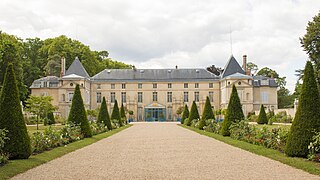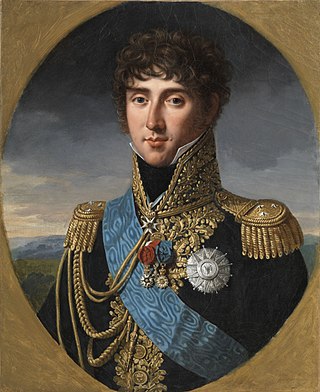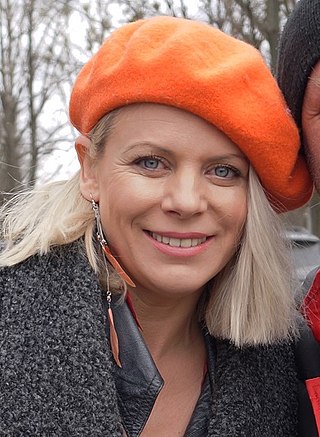Related Research Articles

The House of Bonaparte is a former imperial and royal European dynasty of Italian origin. It was founded in 1804 by Napoleon I, the son of Corsican nobleman Carlo Buonaparte and Letizia Buonaparte. Napoleon was a French military leader who rose to power during the French Revolution and who, in 1804, transformed the French First Republic into the First French Empire, five years after his coup d'état of November 1799. Napoleon and the Grande Armée had to fight against every major European power and dominated continental Europe through a series of military victories during the Napoleonic Wars. He installed members of his family on the thrones of client states, expanding the power of the dynasty.

Joséphine Bonaparte was Empress of the French as the first wife of Emperor Napoleon I from 18 May 1804 until their marriage was annulled on 10 January 1810. As Napoleon's consort, she was also Queen of Italy from 26 May 1805 until the 1810 annulment. She is widely known as Joséphine de Beauharnais.

The Château de Malmaison is a French château situated near the left bank of the Seine, about 15 kilometres (9.3 mi) west of the centre of Paris, in the commune of Rueil-Malmaison.

Alexandre Florian Joseph, Count Colonna-Walewski, was a Polish and French politician and diplomat, the unacknowledged son of French emperor Napoleon I.

Marie Walewska, Countess Walewska was a Polish noblewoman in the court of Napoleon I who used her influence to sway the emperor towards the creation of an independent Polish state. In her later years she married count Philippe Antoine d'Ornano, an influential Napoleonic officer.

Walewice is a village in the administrative district of Gmina Bielawy, within Łowicz County, Łódź Voivodeship, in central Poland, on the Bzura River. It lies approximately 19 kilometres (12 mi) west of Łowicz and 39 km (24 mi) north of the regional capital Łódź.

Paula Maria Bonaparte Leclerc Borghese, better known as Pauline Bonaparte, was an imperial French princess, the first sovereign Duchess of Guastalla, and the princess consort of Sulmona and Rossano. She was the sixth child of Letizia Ramolino and Carlo Buonaparte, Corsica's representative to the court of King Louis XVI of France. Her elder brother, Napoleon, was the first emperor of the French. She married Charles Leclerc, a French general, a union ended by his death in 1802.

Conquest is a 1937 American historical-drama film directed by Clarence Brown and starring Greta Garbo, Charles Boyer, Reginald Owen. It was produced and distributed by Metro-Goldwyn-Mayer. It tells the story of the Polish Countess Marie Walewska, who becomes the mistress of Napoleon in order to influence his actions towards her homeland. The supporting cast includes Alan Marshal, Henry Stephenson, Leif Erickson, Dame May Whitty, George Zucco, and Maria Ouspenskaya.

Philippe Antoine d'Ornano, Comte d'Ornano was a French soldier and politician who fought in the French Revolutionary Wars and the Napoleonic Wars. He was made a Marshal of France in 1861.

Napoleon is a 2002 historical miniseries which explores the life of Napoleon Bonaparte, potrayed by Christian Clavier. It was the most expensive television miniseries in Europe up to that time, costing an equivalent of (USD) $46,330,000 to produce. The miniseries covered Napoleon's military successes and failures, including the battles of Austerlitz, Eylau, and Waterloo and the retreat from Russia. It also delved into Napoleon's personal life: his marriage to and divorce from Josephine de Beauharnais, his marriage to Marie Louise, the Duchess of Parma and daughter of Francis II, and his affairs with Eleanore Denuelle and Marie Walewska. The series draws from Max Gallo's biography.

Charles, Prince Napoléon is a French politician who is the disputed head of the Imperial House of France and, as such, heir to the legacy of his great-great-granduncle, Emperor Napoléon I.
"A Soldier's Farewell" is the third episode of the fifth series of the British television sitcom Dad's Army. It was originally transmitted on 20 October 1972.

Napoléon is a 1955 French historical epic film directed by Sacha Guitry that depicts major events in the life of Napoleon.

Gustaw Teofil Holoubek was a Polish actor, director, member of the Polish Sejm, and a senator.
Octave Aubry was a French novelist and historian.

Maria Sadowska, also credited as Marysia Sadowska or simply as Marysia, is a Polish pop singer, music producer, screenwriter and film director.

The Walewski family was an influential Polish noble family which originated from Walewice in Łęczyca Land, firstly mentioned in 1382.
Countess Walewska is a 1914 Polish historical film directed by Aleksander Hertz and starring Stefan Jaracz, Maria Dulęba and Bronisław Oranowski. The film was made as a co-production with the French company Pathé Frères. It portrays the life of Maria Walewska the Polish-born mistress of the French Emperor Napoleon.

Marie-Anne Walewska, Duchess Colonna-Walewski,, was a French courtier and royal mistress. She served as Première dame d'honneur to Empress Eugénie de Montijo in 1868–1870, and was the last to perform this function in France. She is also known for her relationship to Emperor Napoleon III of France in 1857–1861.

Count Rodolphe-Auguste Louis Maurice d'Ornano was a French aristocrat and politician during the Second French Empire.